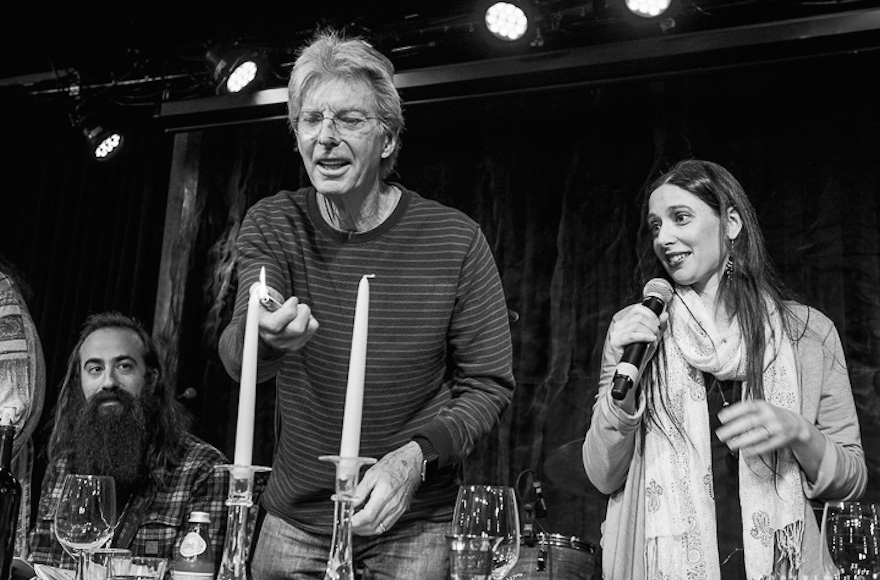Phil Lesh, Grateful Dead bassist who hosted musical Passover seders, dies at 84
Jewish Deadheads mourned Lesh, who played with the legendary jam band for three decades

Phil Lesh lights the candles as Jeannette Ferber, a cantorial soloist at Berkeley’s Renewal congregation Chochmat HaLev, sings the blessing, and guitarist Ross James looks on. (© Bob Minkin Photography / www.minkinphotography.com)
(JTA) — Among the legions of Grateful Dead fans mourning Phil Lesh are a small but devoted cohort of Jewish Deadheads with memories of celebrating Passover with him.
“To life! To Phil! Our love will not fade away! Eternally grateful,” the Jewish vocalist Jeannette Ferber posted on Facebook, alongside a picture showing herself with Lesh at a seder.
Lesh, the legendary jam band’s bassist, died Friday at 84. His Instagram account, which announced his death without specifying a cause, said Lesh was “surrounded by his family and full of love” and “leaves behind a legacy of music of love.”
That legacy includes facilitating musical Jewish holiday celebrations at Terrapin Crossroads, a restaurant and music venue that he operated with his wife in San Rafael, California, from 2011 until 2021. Lesh was not Jewish, but he was long aware of the large number of Jewish fans among the Grateful Dead’s devoted following and sought to create space for them in the community-oriented venue.
“We want to honor all traditions of our fans — as what is community without its traditions and world view?” he told J. The Jewish News of Northern California in 2014, the year of the first seder. After the Passover meal, which featured food donated by a deli owner and Deadhead, Lesh’s Terrapin Family Band played a two-hour set including covers of the spiritual “Go Down Moses” and Bob Marley’s “Exodus.”
Ferber, then the cantorial soloist at the Berkeley, California, Renewal congregation Chochmat HaLev, led most of the seder, kicking off a recurring event that always ended with an extended set featuring Lesh and regularly sold out.
“This is my family, and who I spend the most time with, so it makes sense that this is how I’d spend my Passover,” Brian Markovitz, who ran the deadheadland website as well as the Facebook group Jews for Jerry, told the Jewish Telegraphic Agency in 2016. “It’s so great that Phil recognizes that.”
The seders drew on Lesh’s longtime ties to Jews and Jewish culture. Born in Berkeley in 1940, he was devoted to music from an early age and learned to play bass after being recruited by Jerry Garcia in 1964 to join a band that would become the Grateful Dead. The band’s big break came after the famed rock promoter Bill Graham, a child refugee from the Nazis whose mother was murdered at Auschwitz, booked a gig at the Fillmore San Francisco. Its members — including one Jew, Mickey Hart — continued to play together until Garcia’s death in 1995. Afterwards, Lesh performed with his own group, Phil Lesh and Friends.
Jewish affinity for the Grateful Dead has bordered on the religious, with Jewish Deadheads holding prayer and music retreats around the country. “Jews and the Dead relate in that we both wander,” a Deadhead from Jerusalem told JTA during a 2012 retreat at the Isabella Freedman Jewish Retreat Center in Connecticut. (A contemporary successor to the Grateful Dead, Phish, is similarly entwined with Jewish cultural and religious identity, according to a recent scholarly book; Lesh performed with his former Grateful Dead bandmates for the last time in a joint concert with Phish.) The fan group behind the seders has continued coming together for holidays, including most recently for a Sukkot concert last week.
For Lesh, who is survived by his wife and two sons, the seders were meaningful events that he returned to even when he was no longer needed to host.
“Who knew you could have so much fun at a seder?” he asked at the first seder in 2014. “Words fail me.”
In 2020, with Terrapin Crossroads closed because of the pandemic, he joined a group of diehards at a virtual seder. “I wouldn’t miss this for anything,” he said.
A message from our CEO & publisher Rachel Fishman Feddersen
I hope you appreciated this article. Before you go, I’d like to ask you to please support the Forward’s award-winning, nonprofit journalism during this critical time.
We’ve set a goal to raise $260,000 by December 31. That’s an ambitious goal, but one that will give us the resources we need to invest in the high quality news, opinion, analysis and cultural coverage that isn’t available anywhere else.
If you feel inspired to make an impact, now is the time to give something back. Join us as a member at your most generous level.
— Rachel Fishman Feddersen, Publisher and CEO